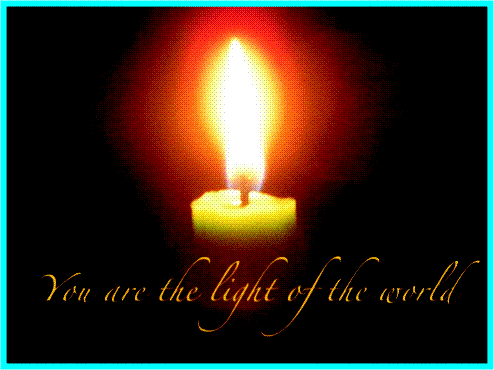| THE LIGHT OF THE WORLD | |
 "You are the light of the world. A city which is situated on the top of a mountain cannot be hidden; nor do people light a lamp and put it under a bushel, but on a lampstand; and it gives light for all who are in the house" (Matthew 5:14,15). When Jesus said that the Christian must be the light of the world, what did He mean? A light is first and foremost something which is meant to lighten up a room and to be seen. The houses in Palestine were very dark with only one little circular window, perhaps not more than eighteen inches across. The lamp was like a sauce-boat filled with oil with the wick floating in it. Normally the lamp stood on the lampstand which would be no more than a roughly shaped branch of wood. The primary duty of the light of the lamp was to give light so that people could see and be seen. In the same way, Christianity is something which is meant to be seen. As someone has well said, "There can be no such thing as secret discipleship, for either the secrecy destroys the discipleship, or the discipleship destroys the secrecy." A man's Christianity should be perfectly visible to all men. Further, this Chris-tianity should not be visible only within the Church. A Christianity whose effects stop at the church door is not of much use to anyone. It should be even more visible in the ordinary activities of the world. Our Christianity should be visible in the way we treat a shop assistant across the counter, in the way we order a meal in a restaurant, in the way we treat our employees or serve our employer, in the way we play a game or drive or park a motor car, in the daily language we use, in the daily literature we read. A Christian should be just as much a Christian in the factory, the workshop, the shipyard, the mine, the schoolroom, the surgery, the kitchen, the golf course, the playing field as he is in Church. Jesus did not say, "You are the light of the Church"; He said, "You are the light of the world," and in a man's life in the world his Chris-tianity should be evident to all. A light is a guide. On the estuary of any river we may see the line of lights which marks the channel for the ships to sail in safety. We know how difficult city streets are to navigate when there are no lights. A light is something to make clear the way. In the same way a Christian must make the way clear to others. That is to say, a Christian must of necessity be an example. There are many people in this world who have not the moral strength and courage to take a stand by themselves, but if someone gives them a lead, they will follow; if they have someone strong enough to lean on, they will do the right thing. It is the Christian's duty to take the stand which the weaker brother will support, to give the lead which those with less courage will follow. The world needs its guiding lights; there are people waiting and longing for a leader to take the stand and to do the things which they do not dare to do by themselves. A light can often be a warning light. A light is often the warning which tells us to halt when there is danger ahead. It is sometimes the Christian's duty to bring to his fellow-men the necessary warning. That is often difficult, and it is often hard to do it in a way which will not do more harm than good; but one of the most poignant tragedies in life is for someone, especially a young person, to come and say to us, "I would never have been in the situation in which I now find myself, if you had only spoken in time." It is said of Florence Allshorn, a famous teacher and principal, that if she ever had occasion to rebuke her students, she did it "with her arm round about them." If our warnings are given, not in criticism, not in condemnation, not in the desire to hurt, but in love, they will be effective. The light which can be seen, the light which warns, the light which guides, these are the lights which the Christian must be. [From: The Gospel of Matthew, William Barclay, The Saint Andrew Press Edinburgh, 1975]. |
|

